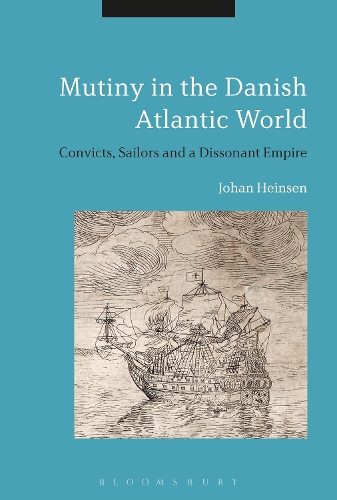
Mutiny in the Danish Atlantic World: Convicts, Sailors and a Dissonant Empire
(Paperback)
Available Formats
Publishing Details
Mutiny in the Danish Atlantic World: Convicts, Sailors and a Dissonant Empire
By (Author) Johan Lund Heinsen
Bloomsbury Publishing PLC
Bloomsbury Academic
18th April 2019
United Kingdom
Classifications
Tertiary Education
Non Fiction
History and Archaeology
Colonialism and imperialism
325.3489009032
Physical Properties
Paperback
240
Width 156mm, Height 234mm
345g
Description
*** Danish Historical Society Award Winner (2018) Historical research result of the year *** Mutiny in the Danish Atlantic World discusses how the storytelling of the lower classes shaped antagonisms and struggles for agency in the early modern Atlantic. It takes a mutiny carried out by a group of convicts and sailors on board a Danish ship, the Merman, in 1683 as its central case study. En route to Denmarks Caribbean colony of St. Thomas, the mutineers seized the ship, murdered the captain and six others and elected a former convict as their new leader. This event brought the West India Company to the brink of destruction and changed the course of the fledgling Danish maritime empire forever. Arguing that the mutiny on the Merman was informed by stories and rumour that circulated on both sides of the Atlantic and echoed on the lower deck of the ship itself, Johan Heinsen explores the role of such stories in the social worlds of early modern colonialism. He argues that sites such as ships, colonies and even prisons resonated with words, paying particular attention to how such storytelling created bonds and enabled action. In making the point that historians should pay careful attention to the power of the words of colonial and maritime lower class subjects, Heinsen draws on comparable cases across the early modern seas. Heinsens study brings the Danish Empire to a new Anglophone audience, expanding our knowledge of the Atlantic world. It brings a fascinating new perspective to topics such as the history of penal transportation, coerced labour and historiographies of storytelling and rumour, making it an important book for students and scholars of Atlantic, maritime, imperial and global labour history.
Reviews
[A] tour de force of social history from below. Theoretically sophisticated and beautifully written, the book will stimulate debate in graduate seminars and among scholars engaged in writing a global history from below. It deserves a broad, attentive audience. * H-War *
This is a wonderful and energetic reading of early Danish colonial projects in the Atlantic [Heinsen] has presented a thought-provoking book that is relevant not merely to scholars of Danish maritime and Atlantic history, but also to historians interested in the role played by subaltern thoughts and actions in the building of empires, small and large. * Journal of Social History *
The bulk of the text consists of the authors analysis of the mutiny, in which he speculates about the role that the storytelling, rumors, and myths of the major actors may have played in shaping the mindset of the exploited denizens of the lower decks and the company men above them, who effectively changed the Danish empire forever. * CHOICE *
The author is ... able to provide a rich and detailed narrative of the events unfolding on the ship, and the individuals involved, which is a great value of this book. * European History Quarterly *
Deeply researched and beautifully written, Johan Heinsens new book is not only one of the most sophisticated studies of mutiny in the early modern Atlantic world. It is also a highly creative, theoretically driven meditation on the dissonant noises of the archive, and a powerful recovery of the faint, distant muttering of those violently muted makers of history, the Atlantic proletariat. This is bottom-up history at its very best. * Niklas Frykman, Assistant Professor of History, University of Pittsburgh, USA *
This innovative history of the Danish Atlantic is global history from the bottom up of the very best kind. Bringing the history of convicts, slaves and indentured servants to bear on histories of mutiny, resistance and subaltern agency, it will become a vital reference point in the history of European empires in the seventeenth century, and the history of the Atlantic world. * Clare Anderson, Professor of History, University of Leicester, UK *
Author Bio
Johan Heinsen is Assistant Professor of History at Aarlborg University, Denmark. He has published articles in journals including Atlantic Studies and Radical History Review.
